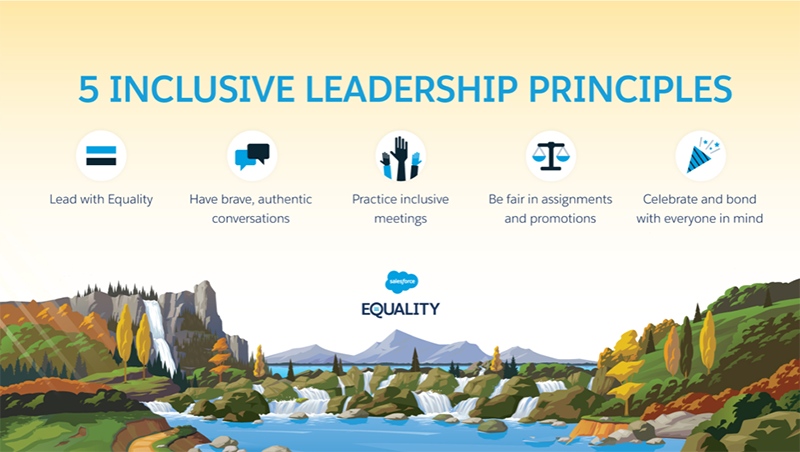This post was originally published on the Salesforce.org blog.
When companies focus on building a culture of equality at work — they help employees thrive, create deeper customer connections, and drive positive social change in the world around them.
As the workforce becomes more diverse, organizations have the opportunity to elevate their employee’s work experience by cultivating authentic inclusion. If diversity is the presence of people from various backgrounds and identities — then inclusion is when every single person in the community feels valued, heard, respected, empowered, and a true sense of belonging. By combining the two, then you begin to foster a true culture of equality.
What is inclusive leadership?
An inclusive leader is anyone one who understands their team members’ unique strengths, elevates them, uses their platforms to advocate for their employees, and fosters an environment where everyone feels empowered to be their full, authentic selves.
Employees naturally gravitate towards leaders who are inclusive and mindful of their personal needs and identity. Inclusive leadership is no longer a nice-to-have leadership style, but a necessary leadership style.
The Salesforce Office of Equality has distilled our inclusive leadership practices into five core practices. Let’s take a look at these in action:

1. Lead with Equality
To cultivate inclusive leadership, integrate equality into everything you do. Keep equality top of mind in every business decision and relationship. Here are some ways you can implement this:
- Add equality to your organization’s annual goals and vision statement for all to follow.
- Practice Inclusive Hiring — strive to have a diverse candidate pool that reflects our communities, map candidates to core competencies and company values, not a culture fit.
- Be an Ally — Each one of us can help elevate the voices and platforms of our employees and team members by following four simple ally practices: Ask, Listen, Show Up, and Speak Up. Ask others about their experience and share yours. Listen with empathy and seek to understand different perspectives. Show Up by being present, engaged, and committed. Speak Up as an advocate and evangelize your allyship among others.
2. Have brave, authentic conversations
A key part of any relationship, particularly a healthy working relationship, is to listen to others with empathy. Listen to understand; don’t just listen to respond. Create a safe space where others feel comfortable to voice their true concerns at work. Share your story too — it’s important to take the lead and share your own authentic story. Through all of this, understand that at the end of the day, we are all human and all make mistakes. Understand that at times the intent of a message may have been positive, but the impact may be different. Emphasize accountability and forgiveness in your team.
3. Practice inclusive meetings

Consider how your meetings are run and ensure all attendees feel valued and respected. If needed, prompt those who are quieter with questions such as, “What are your thoughts,” or “How would you approach this problem?” If someone is interrupted, make sure to address it in the moment. You can do this by saying, “I don’t think ______ is finished with their statement.” Be mindful of remote employees too — it can be easy to forget attendees who are not in the room. Make it a point to address those who are on the video conference and make sure their opinion is heard. One tip: wait a full 7 seconds when asking “does anyone have any questions?” to give time for anyone who may need to work up a little more courage to speak.
4. Be fair in assignments and promotions
Be aware of unconscious bias — any unsupported judgments in favor of or against one thing, person, or group as compared to another — when assigning work projects or reviewing promotions. Take the following into consideration:
- Spread High-Visibility Projects: Ask yourself, “Are the same people on my team getting high-visibility projects over and over?” Give all members on your team the opportunity to step up.
- Consider Your Promotions: Did everyone have an equal opportunity? Were all candidates evaluated fairly?
- Share the Promotion Process: Is your promotion process transparent? Do people know what it takes to get promoted? Are professional development conversations taking place all year round?
5. Celebrate and bond with everyone in mind

Celebration and team bonding activities are important parts of our culture and life at work. They bring us closer to our colleagues in a relaxing and fun setting. As a leader, be mindful of the way your team celebrates and bonds. When planning a team activity, consider the time (for example, happy hour vs. lunch), the location and nature of the activity (for example, a sports bar vs. a team volunteering event), and whether everybody is able to participate in and share their authentic selves during the chosen activity.
At the end of the day, we all have the power to influence change and help build inclusive work environments. Practicing inclusive leadership is not only a top-down philosophy, but it’s something that we can all do. Inclusion begins with you. Take the Inclusive Leadership Trailhead module and learn more about our commitment to Equality for All.









